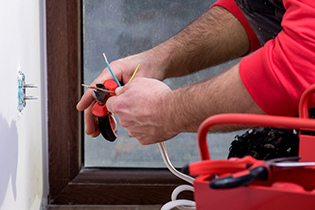How to Become an Electrician
January 12, 2024 | ed2go

In a world fueled by technology and innovation, the demand for skilled professionals in the electrical industry has never been greater. Becoming an electrician is not just about wiring circuits; it is a pathway to a dynamic and rewarding career that plays a crucial role in powering our homes and businesses.
If you are someone who enjoys working with your hands, solving complex problems, and being at the forefront of technological advancements, then embarking on the journey to become an electrician could be a great opportunity.
Job Outlook and Salary for Electricians
According to the U.S. Bureau of Labor Statistics (BLS), jobs for electricians are expected to increase by 6% over the next decade, a rate much faster than the average for all professions (3%). This surge in demand is attributed to several factors, including the ongoing expansion of the construction industry, the need for alternative energy sources, and the increasing complexity of electrical systems in both residential and commercial settings.
As our society becomes more dependent on advanced technology and renewable energy solutions, electricians find themselves at the forefront of progress. From installing solar panels to wiring smart homes, the skill set of electricians continues to be in high demand across various industries.
As of May 2022, the BLS reports that the median annual salary for electricians is $60,240, with the top 10% earning over $102,300. In comparison, Indeed.com data shows the average salary for an electrician is $62,971 per year in the U.S. as of December 2023. The average salary of an electrician in Florida is $50,710 per year according to the BLS and $53,691 according to Indeed.com.
Steps for Becoming an Electrician
Here are a few steps to help you start your career as an electrician:
Step 1: Research the Profession
Start your journey to becoming an electrician by learning about the job. Discover the roles electricians play, the skills they need, and the different areas they work in. This will help you decide if being an electrician is the right choice for you.
Step 2: Get a High School Diploma or Equivalent
To join electrician training programs, you usually need a high school diploma or an equivalent qualification. Make sure you meet this basic requirement to be eligible for formal electrician training.
Step 3: Join a Good Electrician Course
The next step is to enroll in a comprehensive training course. Our 100% online Residential Electrician course is designed to help you succeed. This course uses advanced features like 3D models, interactive walk-throughs, and fun games to make learning enjoyable. It prepares you for the real challenges you will face as an electrician.
As a bonus with your course registration, you will receive a 19-piece tool kit carrier from IDEAL Electrical. This kit has essential tools like pliers, screwdrivers, and an electrical tester. These tools will help you practice hands-on skills and apply what you have learned.
Step 4: Participate in Apprenticeships
Many aspiring electricians start as apprentices. Look for apprenticeship programs in your area, where you can work alongside experienced professionals, gaining valuable on-the-job training and earning a wage while you learn.
Step 5: Prepare for Licensing Exams
Understand the licensing requirements in your state or locality. Most areas require electricians to pass a licensing exam.
Our course ensures you are ready for electrician licensing exams. You will learn about common situations in electrical work, including using the National Electrical Code and local electrical codes, circuits, and various wiring methods.
Step 6: Network and Seek Mentorship
Connect with experienced electricians and join professional organizations. Networking can provide valuable insights, job opportunities, and mentorship, helping you navigate your career path more effectively.
Step 7: Build a Portfolio and Resume
Document your experiences, projects, and certifications to create a strong portfolio and resume. Highlight any specialized training or projects you have worked on during your education and apprenticeship.
Step 8: Apply for Entry-Level Positions
Once you have completed your training and met the licensing requirements, start applying for entry-level positions. Showcase your skills, knowledge, and commitment to continuous learning during the application process.
Start Your Career as a Residential Electrician
Becoming an electrician is more than just a job; it is a commitment to powering the future. The demand for skilled professionals in this field is growing, and with the right knowledge, practical skills, and tools, you will be well-prepared to start a lucrative electrician career.
After completing the Residential Electrician course and passing your state's electrical licensing exam, you will be ready to begin your entry-level career as a residential electrician or electrician apprentice. Enroll today!






